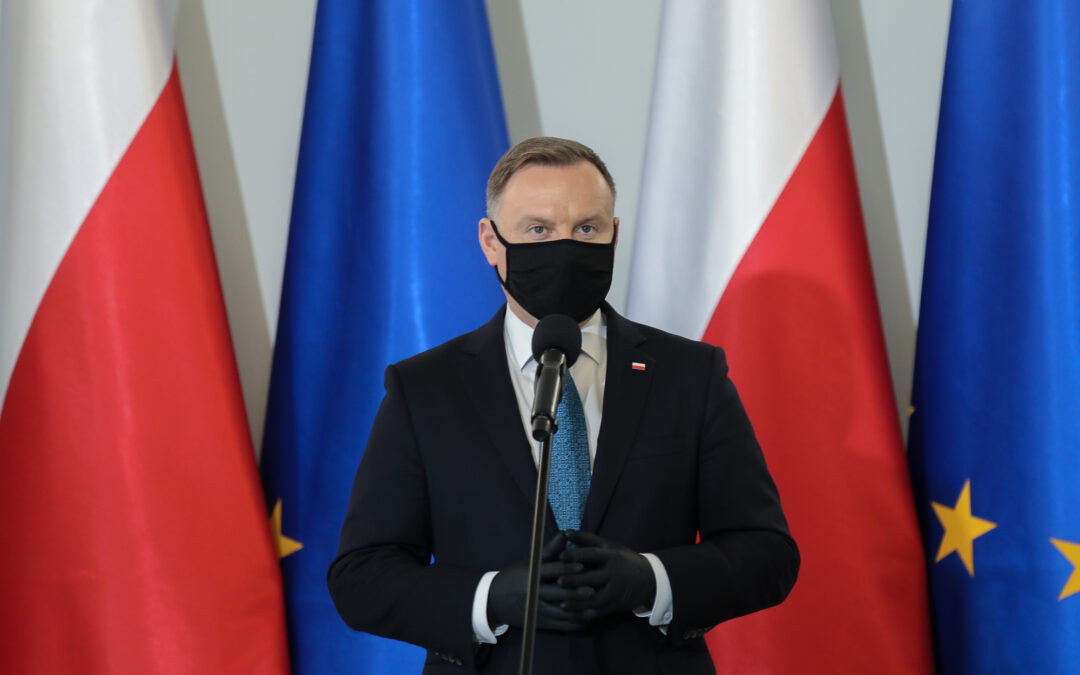President Andrzej Duda has proposed a new “compromise” on abortion designed to respect last week’s Constitutional Tribunal ruling – which appeared to decree an almost complete ban on abortion in Poland – but while also, he claims, maintaining the essence of the current law.
In their decision, the judges of the court found that abortions in cases where the foetus has serious and irreversible birth defects are unconstitutional. These make up around 98% of all legal terminations in Poland, so the ruling seemed to require a near total prohibition on abortion.
The judges’ decision has sparked a week of mass protests, which are believed to be the largest in Poland since the fall of communism in 1989.
However, earlier this week, Duda suggested that he favoured a less strict interpretation of the ruling. He wants abortion in cases where foetuses are diagnosed with conditions such as Down syndrome (which is currently permitted) to be outlawed. However, if there is a severe defect that makes the foetus nonviable, the mother could still choose to terminate it.
“I understand the women who are protesting, but everyone knows that I am against eugenic abortion,” Duda told Polsat News on Wednesday, employing a term that he and other Polish conservatives use to refer to abortions carried out due to birth defects.
“However, when there are so-called fatal defects, that is those that cause the child to die immediately after birth, this is a very special situation,” he added. “We have to work on solutions so that children with, for example, Down syndrome are protected but that women are not exposed to mental and physical suffering.”
Of the 1,116 legal abortions conducted in Poland last year, around 24% were carried out due to the diagnosis of Down syndrome, notes fact-checking website Konkret24. When including cases in which Down syndrome is diagnosed alongside other conditions, the proportion rises to 39%.
Last weekend, Agreement (Porozumienie), one of the junior partners in Poland’s conservative ruling coalition, proposed a solution similar to Duda’s idea. Yesterday it was reported that the party’s leader, deputy prime minister Jarosław Gowin, had met with the president.
This afternoon, Duda confirmed that he has decided to submit legislation to parliament that would amend the current abortion law, which has been in place since 1993.
“Taking into account the instructions of the [Constitutional] Tribunal, the [proposed] bill provides for…the possibility of terminating pregnancy only in cases of so-called fatal defects, when prenatal tests indicate a high probability that the child will be born dead or be burdened with an incurable defect leading to inevitable death,” said the president, quoted by TVN24.
The other two currently permitted reasons for abortion – if the pregnancy threatens the mother’s life or health, or if it is the result of a criminal act such as rape or incest – would remain.
Duda’s announcement follows a report this morning from RMF24, based on inside sources, that the ruling Law and Justice (PiS) has been pushing for him to propose a solution to the current crisis.
Duda is officially a nonpartisan, independent figure, but in practice is a close ally of PiS, whom he previously served as an MEP and which supported his re-election earlier this year.
RMF24 notes that there are divisions within PiS on how to implement the abortion ruling, with some pushing for a ban on abortion in all cases of birth defects.
Duda’s new legislation, if approved by parliament, could also be sent to the Constitutional Tribunal for a further ruling. However, the institution – though also officially independent – is seen as being under the influence of PiS and its powerful leader Jarosław Kaczyński, who is a close personal associate of the tribunal’s president.
It is certain that Duda’s proposal will not be enough to satisfy the women’s rights groups who are the main organisers of current protests. They would still see his legislation as a further restriction of the law, when most of them favour liberalisation.
Polling indicates that, among society as a whole, only a minority (around 10-15%) favour tightening Poland’s current 1993 abortion law. Around 40-50% prefer to maintain the current 1993 law, while 30-40% want it to be liberalised.
The president claims that his bill still “reflects the essence of the so-called abortion compromise of 1993” by leaving in place the same three reasons allowed for abortion. But, by preventing abortion for conditions such as Down syndrome, it is also “consistent with the ruling of the Constitutional Tribunal”.
“I am counting on a broad political consensus in this matter,” said Duda today, quoted by 300Polityka. He argues that what he is proposing reflects the demands of those within the ruling coalition and parts of the opposition, as well as “the majority of Poles”.
Duda also expressed hope that his proposal can “calm down the mood”, reports RMF24. “I appeal to all politicians, public figures and millions of Poles for mutual respect and a lowering of social emotions”, he said. “We have to be able to talk to each other.”
The government has warned that the mass protests amid the pandemic will accelerate the spread of coronavirus, with cases already at record levels. It has also condemned incidents of aggression and vandalism during the overwhelmingly peaceful protests.
The main organisers of the demonstrations plan to hold the largest protest so far in Warsaw today, calling on people from around the country to travel to the capital.
Main image credit: Jakub Szymczuk/KPRP/Prezydent.pl

Daniel Tilles is editor-in-chief of Notes from Poland. He has written on Polish affairs for a wide range of publications, including Foreign Policy, POLITICO Europe, EUobserver and Dziennik Gazeta Prawna.




















